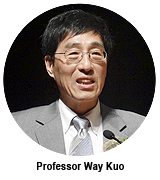President counsels students on life beyond school
The President of City University of Hong Kong (CityU) offered his advice to secondary school students at the graduation ceremonies of Tuen Mun Catholic Secondary School and Ching Chung Hau Po Woon Secondary School on how best to manage major transitions in life.
“Today is the day you finish your secondary school studies,” said Professor Way Kuo. “Now you will enter a new stage. Whichever path you choose, you will mature, accumulate knowledge and gain a better understanding of the world.”
Professor Kuo emphasised the importance of vision and foresight. “If you are forever swimming to catch the tide of popular feeling, you are already two or three strokes behind,” said Professor Kuo. “Remember that the tide has been coming in for some time. Likewise, if you are forever chasing the ferry as it throws off its mooring ropes, you will never be assured of a seat.”
Professor Kuo asked those students aiming at college education “to identify what is tomorrow-oriented” and select a university or major “that is aligned with scientific and technological trends that will meet the needs of the future” as well as ones that suit their abilities, aptitude and temperament.
He also urged the students to “broaden their vision” and “explore every possible avenue of interest” so that they could adapt to changes in life. “One of the best remedies is what we call Gateway Education at CityU,” said Professor Kuo, exposure to which offers “a range of subjects instead of being confined to just one”.Professor Kuo concluded by sharing his secrets to success: discipline, passion and perseverance, three attributes that will help young people create their own success stories.
“Make good use of every minute of your time to chase the dream in your heart. Success doesn’t come easily; you need to pass through the storm to see the rainbow,” he said, quoting the lyrics from a popular song, “The Real Hero”.

